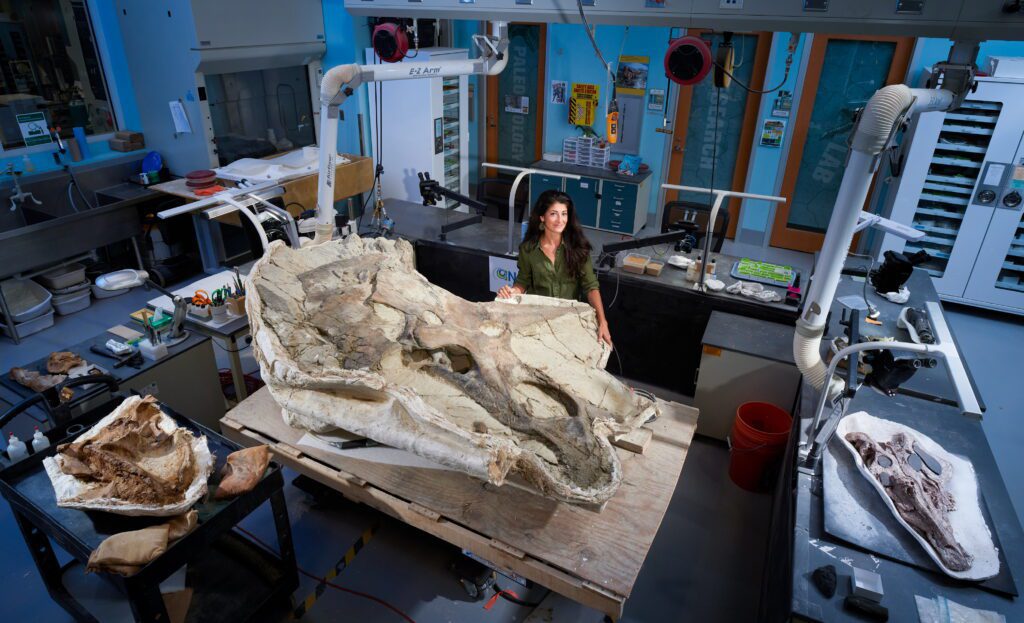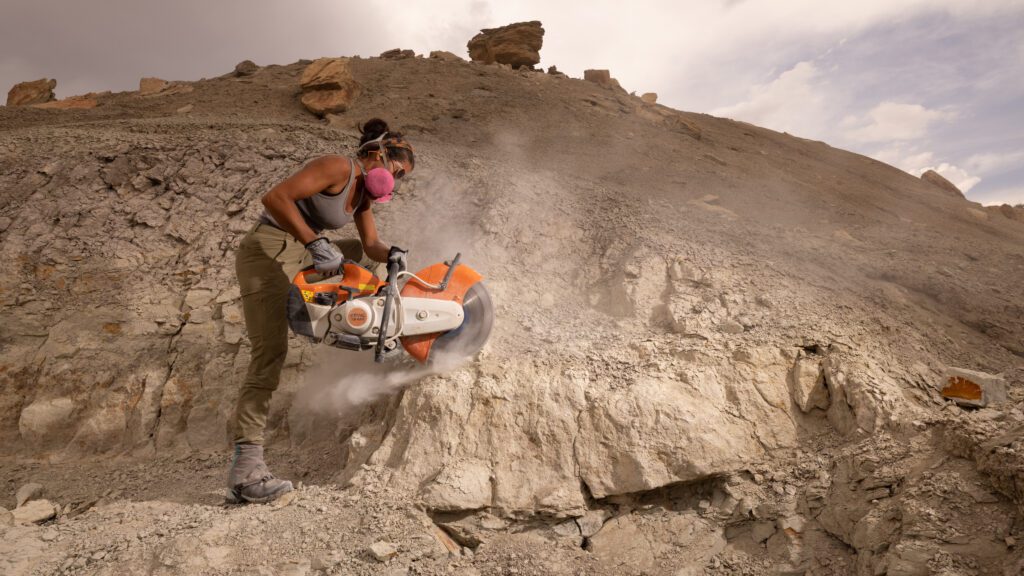Thursday, June 8, 2023
“When I first stumbled upon fossils and evolution” — at the American Museum of Natural History in New York City as a child — “it sort of blew my mind open,” says Dr. Lindsay Zanno, now head of paleontology at the North Carolina Museum of Natural Sciences.
On Tuesday, June 13, Dr. Zanno will give a talk, “T. Rex Rises,” at the Lincoln Theatre, 1215 U St. NW. The 7 p.m. event is part of the nationwide Nat Geo Live! series. Tickets are available on the National Geographic Society and Lincoln Theatre websites.
Based in Raleigh, Dr. Zanno, associate research professor in the Department of Biological Sciences at North Carolina State University, is a top expert on theropods: hollow-boned dinosaurs that walked and ran on two legs with clawed, three-toed feet.

Dr. Lindsay Zanno in her lab with a fossilized Triceratops skull. Photo by Mark Thiessen/ Becky Hale. Courtesy National Geographic.
Among the theropods — a group that thrived from the Late Triassic Period through the Jurassic and Cretaceous Periods, roughly from 231 to 66 million years ago — are apex predator Tyrannosaurus rex and the velociraptors of “Jurassic Park” fame (though actually smaller than in the films), which date to the Late Cretaceous.
Small, feathered theropods, the coelurosaurs, are believed to be the ancestors of modern birds. Advancing work decades earlier by Yale University’s John Ostrom, fossils uncovered in northeast China in the early 1990s — perfect timing for Steven Spielberg — came to be identified as dinosaurs with feathers, a breakthrough that energized the field of paleontology.
Having discovered more than a dozen new species of dinosaurs, Dr. Zanno is at the forefront of the field, and one of relatively few women paleontologists. “We’re still a very small group,” she says.
Though she started out as a pre-med student at the University of New Mexico, intending to become a surgeon, “Dinosaurs kind of stole my heart back.” After completing a bachelor’s in biological anthropology in Albuquerque, she stayed out West, earning a Ph.D. in geology at the University of Utah — “the only female,” she notes, to graduate from that program.
Dr. Zanno recently became part of the “global community of solution seekers” — researchers, educators, computer scientists, conservationists, adventurers, artists, photographers and filmmakers — known as National Geographic Explorers. Among the other members, to name a few: Shabana Basij-Rasikh, head of a boarding school for Afghan girls; Lehua Kamalu, voyaging director of the Polynesian Voyaging Society; Michael Twitty, historian of Black culinary traditions; and Ariel Waldman, “Antarctic explorer and microscopic wildlife filmmaker.”

Dr. Lindsay Zanno uses a stone saw to reveal layers of rock that may contain fossils. Photo by Mark Thiessen / Becky Hale. Courtesy National Geographic.
On June 13, Dr. Zanno will describe her field work in the American West, which receives National Geographic Society funding as part of her Explorer status. Her talk, she says, will “bring the audience on a journey into the field,” covering how T. rex and other “famous dinosaurs” evolved and introducing less familiar ones, including “some so new they don’t even have names yet.”
Communicating science to nonscientists is a passion for Dr. Zanno, who led the design of the first open-concept paleontology lab, the centerpiece of “Dueling Dinosaurs,” a major exhibition set to open at the North Carolina museum early in 2024. Visitors will be able to get “up close and personal” with researchers working on the most complete and best preserved T. rex and Triceratops skeletons unearthed to date.
What is the most challenging concept to get across to the general public? For Dr. Zanno: “That dinosaurs, as incredible as they are … they’re also scientific data,” with the potential to reveal “what will happen to us as humans in the future.”